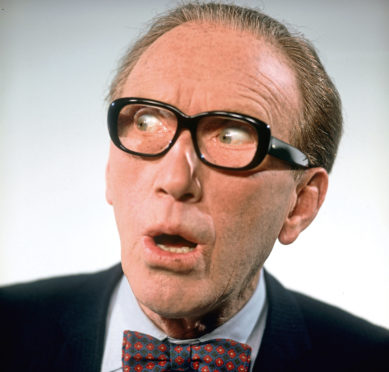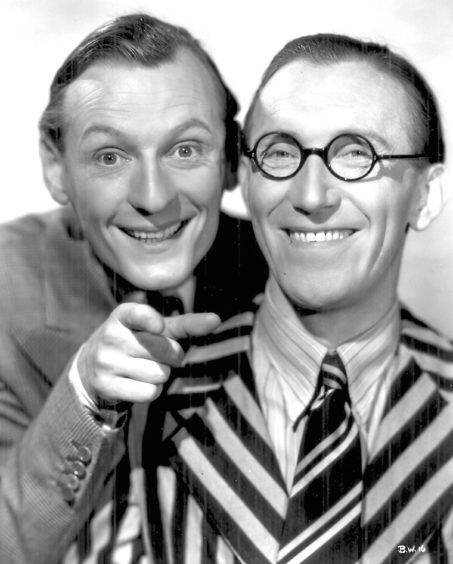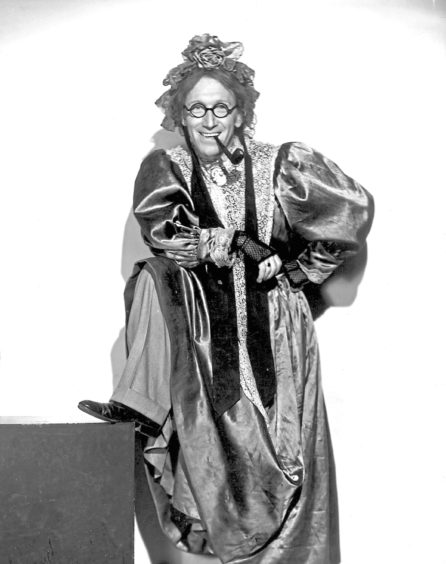
Big-hearted Arthur they called him and he certainly was because he not only loved his audiences but he was always keen to help and advise other performers.
No wonder that Arthur Askey packed audiences into his shows who loved to see him “before their very eyes”.
Arthur Askey was a giant of a man even though he was only a couple of inches over five feet tall. His presence on stage, on TV or just walking into a room gave him a stature well above his physical size.
Arthur was a Liverpudlian, born in June 1900, the same year as the Queen Mother, a fact that was to be a joke between them many years later. Arthur Askey was his real name and his middle name was Bowden, his mother’s maiden name.
He went to school at Liverpool Institute and it was discovered that he had a decent voice which then led to him singing in the Liverpool Cathedral choir, the congregation being his first audience.
When he left school he got a job as a clerk in the Liverpool Education Offices.
“That taught me a thing or two,” he later recalled. “People who work in such offices don’t seem to have much of a sense of humour and when I found something funny I used to mostly get frowned at. It was like organising a concert party in a graveyard.”
Arthur’s sense of fun had been with him since he was just a little lad.
“I have always been a little lad,” he joked. “But I was littler when I was at school and the best way to keep on the right side of the bigger lads was to make ’em laugh. I was good at football too, I had skills that the other lads didn’t have – none of them could run through the legs of the opposing centre-half.”
Arthur’s first love was entertainment. As a Liverpudlian he had an in-built sense of fun and loved seeing the stars of theatre, musical hall and seaside concerts. He loved to laugh but he was also learning and while he was still working as a clerk he took his first steps towards becoming a world-class entertainer by getting a few gigs in local clubs.
“I was a one-man concert party – singing, dancing, telling jokes and making fast exits. I learned something from every performance – and so did the audience, well most of them. Some of them didn’t, they were the ones who invited me back.”
Arthur had wanted to do his bit when the First World War started but it was a while before he was old enough. He enlisted and they took one look at him only just being able to see over his rifle and put him into entertaining the troops, which both he and they loved.
Another invitation came later when Arthur was engaged to join a seaside concert party and for the next 14 years that was his main clame to fame, doing much the same as his club acts but getting better and better at it. He never claimed to be a stand-up comedian but was just a fun bloke to have around.
Although he was only another entertainer hoping for a rainy day at the seaside so that the audiences were bigger than a handful of people and a dog, Arthur did get the approval of someone because he was suddenly offered another job as resident comic at the BBC.
It was not just his performance that led to him being noticed but that he used to make up most of his own material, including silly songs and funny dance moves. He was not tall enough for funny walks but his eccentric movements often had audiences in stitches.
At the BBC he started off with a weekly wage of around £12 per week and was drafted into a new show called Band Waggon along with Richard Murdoch.
Although it has since become a legend, Band Waggon was a disaster at first and was cancelled after two broadcasts. Since there was nothing else immediately available to fill the gap, Arthur and Richard were given the go-ahead to write and perform their own material.
Suddenly it all changed, listeners loved it, word spread and the BBC had a huge success on its hands, one that would remain a huge and encouraging favourite right through the years of the Second World War.
Just before the war, the BBC had also started experimenting with television and Arthur was chosen to be one of the first faces on screen.
“I looked horrible,” he said. “The screen was full of lines – I looked like I was peering through a sheet of music. They put special make-up on me so that people knew it was me. I looked like a refugee from a horror film.”
If anything the war years made Arthur even more popular and his stage appearances, radio and television work and, of course, films, made him a household name.
His catchphrases, including “Ay-Thang-Yew” were on everyone’s lips and he could appear virtually nowhere without demands for his famous Bee Song.
Arthur was even featured weekly in children’s comics, sneakily read by grown-ups after the kids had gone to bed.
Among Arthur’s many fans were the royal family and he was awarded an OBE in 1969 and then a CBE in 1981. His appearances at Royal Variety Performances were legend and added to his popularity, especially when he mentioned being born the same year as the Queen Mother and TV cameras immediately shot to her uncontrolled laughter.
One of Arthur’s great film successes was Charley’s (Big Hearted) Aunt in 1940 and he was in great demand as a pantomime dame.
“I was never that keen to put a frock on,” he said. “I didn’t mind if it was totally for a laugh but as long as people remembered I was a bloke and not trying to get people to forget that I was a bloke, it was all right. I have always been glad to be a bloke, corsets stop you breathing.”
Arthur’s career had its lulls but he always bounced back and never ceased to be anything but a great all-rounder who kept his private life to himself and never allowed his fame to change his personality.
He was married to Elizabeth for nearly 50 years and they had one daughter, Anthea, who often worked with her dad in films, TV and stage shows but was a talented artiste with a career of her own.
Arthur was also keenly into sport, especially football, and that was how I came to meet him first of all. He often used to watch Leyton Orient and that is where we started chatting.
He was very knowledgeable about the game but his sense of fun was never far away and more than once he said he was going to knock on the referee’s dressing room door and offer him the use of his glasses.
Our paths frequently crossed and he always greeted people like they were long-lost friends. Seeing him in full flight at the London Palladium with a huge audience in the palm of his hand was a joy to watch but he was the same backstage as well, as I was once told by the late Ken Dodd, one of Arthur’s greatest fans.
“What a marvellous man, I used to love to watch him perform,” said Doddy. “He used to make me laugh and I learned a lot from his timing and his facial expressions.
“He used to use the audience as a prop quite often and would give them a look as if they had gone off the script and that made them laugh all the more. I don’t like to use the word genius very much but Arthur was a genius and he really was big-hearted too.
“As a young comedian well down the bill you wouldn’t expect a star to take much interest in you but Arthur never saw himself as a star. He would watch you and compliment you on what you got right and give you a few tips on where you could improve.”
His catchphrases became part of the English language, his many comedy songs are still popular, his appearances on television always guaranteed happy viewers, his theatre performances always “sent ’em ’ome ’appy” and his films were such fun that through the years they have gained new generations of fans. Back Room Boy, Ghost Train, I Thank You and all the others are still in demand.
Arthur died in 1982. Earlier that year he had still been working but then in July poor circulation got the better of him and he was admitted to hospital. Because of gangrene he had to have both legs amputated. He eventually died in November and the lights went out.

Enjoy the convenience of having The Sunday Post delivered as a digital ePaper straight to your smartphone, tablet or computer.
Subscribe for only £5.49 a month and enjoy all the benefits of the printed paper as a digital replica.
Subscribe © ITV/Shutterstock
© ITV/Shutterstock  © Moviestore/Shutterstock
© Moviestore/Shutterstock